Digital Storytelling & the Humanities: A post-conference report from the 2017 DH Forum at the University of Kansas
On 28th and 29th September 2017, the Institute for Digital Research in the Humanities (IDRH) held our 7th annual Digital Humanities Forum at the University of Kansas. Organized as a series of workshops, keynotes, panel presentations and poster/exhibit sessions, the conference fosters Digital Humanities conversations and networking among Digital Humanities scholars. The conference places special emphasis on making space for early career scholars by incorporating skill-building workshops and including a student award for best paper presentations. All of this is made possible by the support of our institutional stakeholders—KU Libraries, the College of Liberal Arts & Sciences, and the Hall Center for the Humanities. Over 100 attendees—librarians, students and scholars in a range of disciplines—from Kansas and the wider region attended the 2017 Forum.
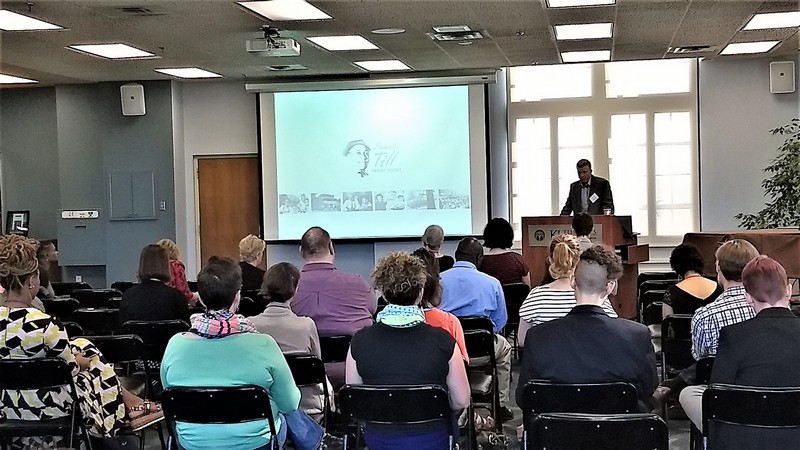
Themed around “Digital Storytelling and the Humanities”, the 2017 DH Forum explored the possibilities afforded by the digital medium in telling stories historically excluded from archives and public spaces, and raised questions about memory, representation, and social justice in digitally mediated stories. The conference opened with a project showcase by Dave Tell, professor in the Department of Communication Studies at the University of Kansas, on The Emmett Till Memory Project. Noting that physical markers in Mississippi related to Till’s murder have been repeatedly vandalized, Tell framed this digital project as an electronic commemoration of Till’s life and murder. Drawing on James E. Young’s concept of the counter-monument, Tell argued that the Emmett Till Memory Project was designed to unsettle the past, and to hinder closure so that users can continue to grapple with troubling racial histories with contemporary significance. Tell’s talk considered the productive potential of electronic remediation; namely, recording a historical moment of racial violence so that new generations can engage with the spaces, texts, and people relevant to that event.
The connections articulated by Tell between digital storytelling, historical memory, and racial violence, were also important to Kim Gallon’s keynote address “Data and the Recovery of Black Humanity in the Digital Humanities.” Gallon, professor of History at Purdue University, urged a critical rethinking of how black life is recorded, represented, and rendered as data. Gallon noted that the dehumanization of black life as data began with the transatlantic slave trade, when enslaved Africans were reduced to commodity and property. Tracing this same pattern in contemporary digital projects, data visualizations, and data-based narratives, Gallon asked about the connection between data, black humanity, and possibilities for black liberation. In examining sites like the Transatlantic Slave Trade Database and various digital visualizations of racial violence, she examined whether these spaces can encode black humanity, and not just black death or black suffering. Gallon’s talk was animated by the notion that we must understand data as an oppressive structure before we turn to its emancipatory potential. While the Digital Humanities has been invested in building and making, we need to consider how digital projects, even if driven by the intent to record racial violence and redress systemic inequities, can reiterate reductive and dehumanizing views of blackness.
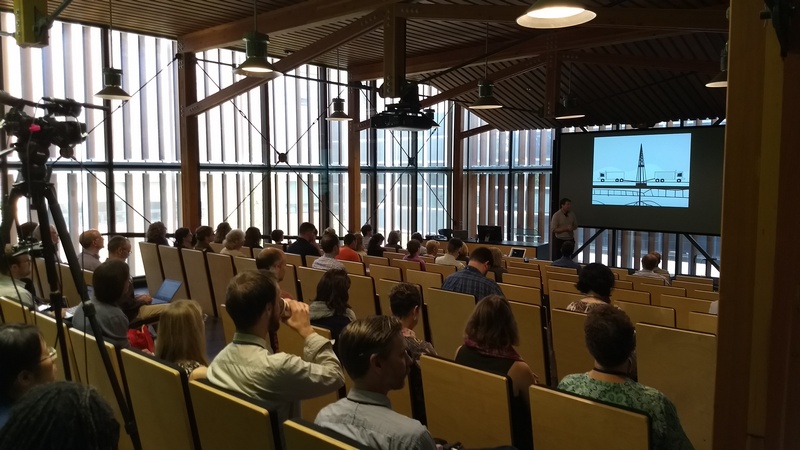
Gallon’s comments on digital technologies and race were directly in conversation with another keynote at the conference. Joseph Erb, a Cherokee animator and professor in the Digital Storytelling Program at the University of Missouri, emphasized the importance of the Cherokee interventions in software companies to build transformative digital technologies. Erb’s keynote, “Community Strength in Storytelling” addressed his work in building digital technologies that sustain Cherokee political imperatives for survival. These imperatives include the passing on of Cherokee histories and stories, the preservation of the Cherokee language, and advocacy on community issues like water pollution. Erb gave several examples of this work, ranging from Cherokee language keyboards, blog templates, and adaptations of the Cherokee font for language advocacy in information technologies, to a new project leveraging Google Maps to visualize and present the borders of the tribal nations. Many of Erb’s projects respond to timely community issues and events and demonstrated the potential of digital storytelling—in his talk, he showed examples of animations he had created for the No-DAPL protests, and more recently, for the eclipse in 2017. Erb noted that this contemporary work is grounded in the historical efforts of the Cherokee who have worked in IBM, Microsoft, and other software companies in the past. In doing so, Erb framed the Cherokee people as technologists, and challenged colonial narratives that position native people as premodern and lacking interest and skills in technological work.
These ideas on how digital storytelling can advance the interests of marginalized people were a sustained topic of conversation at DH Forum this year. Carla Iaccheli, Digital Literacy Librarian the Edmonton Public Library, discussed digital projects at this library which provide a platform for Indigenous voices in the community. The Voices of Amiskwaciy project, a collaborative initiative between the Edmonton Public Library and Indigenous communities and individuals in Edmonton, provides a digital space for creating, sharing, and archiving stories that Indigenous communities wish to share. Noting the history of indigenous dispossession and systemic racism in Canada, Iaccheli traced how this library project sought to tell Indigenous stories while being firmly guided by the perspectives and concerns of local Indigenous communities. In a separate talk, [1]Matthew Kleinmann, a doctoral student at the School of Architecture & Design at KU, framed such community collaborations as participatory design. Speaking specifically about architecture and urban design, Kleinmann argued that community participation in building urban communities improved public health, namely by providing better access to healthy food options and active living.
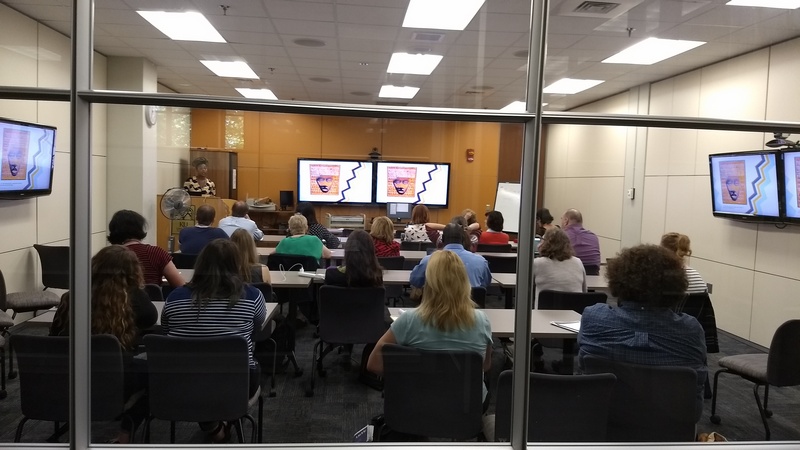
As these talks indicate, one of the recurring themes of the DH Forum this year examined how digital storytelling could be a community-oriented approach to telling and preserving histories and stories that were not part of the traditional archive or canon. This approach envisions the radical and transformative potential of digital technologies and digital spaces when they are co-created with community participation and center the objectives and interests of the community. Aside from this thematic, other talks at DH Forum investigated digital storytelling as an innovative mode of storytelling, with distinct genres, stylistic registers, and aesthetic markers. Anastasia Salter, professor of digital media at the University of Central Florida, delivered a keynote address that examined the poetics of choice and resistance in digital games. Salter argued that historically, and in mainstream gaming today, the player’s choices are restricted to violence. In other words, violence is the default choice for character interactions in the game world. Salter turned to games created by individuals or small teams to look for ways which might undermine traditional game interactions and expectations, and offer choices and actions outside the norm. She shared several examples of games that allow the player to engage with issues related to race, sex, and gender. Salter’s keynote framed digital games as a site of resistance, particularly in the wake of the last U.S. Presidential election. Dennis Tenen, professor of English and Comparative Literature at Columbia University, took us on a journey into the nature of inscription itself and the materiality of electronic text in a talk drawn from his recent book Plain Text, The Poetics of Computation. For Tenen, resistance entails developing an understanding of the mechanisms by which text is created, transmitted and stored—often accompanied by all sorts of insidious corporate baggage that not only serves commercial purposes but fundamentally alters the nature of the text itself—and adopting practices, such as the use of plain text, that promote more direct human agency in our scholarly and cultural communications.
Given these possibilities afforded by digital storytelling, it is no surprise that digital storytelling is finding its way into the university curriculum. Several presentations at the DH Forum shared ways in which this is happening, and looked at the infrastructure, pedagogy, and practices necessary to support such programs. Zachary Coble, from the New York University Libraries, speaking on behalf of a team including his NYU colleagues Rebecca Amato and Bruno Guaraná, discussed the Omeka installations on Reclaim Webhosting that were supporting undergraduate class projects on digital storytelling. In their pedagogical guidelines, Amato and Guaraná stated that it was crucial for instructors to do an Omeka training session early in their classes, and to create a project timeline so that students are aware of and can meet instructor expectations. In other presentations, Kerry Wynn and Tom Averill spoke about their digital storytelling course at Washburn University in which students created digital projects on the history and literature of Kansas, and Lynne Walters and Martha Green of Texas A&M addressed how they trained K-12 teachers to use digital storytelling in their classrooms.
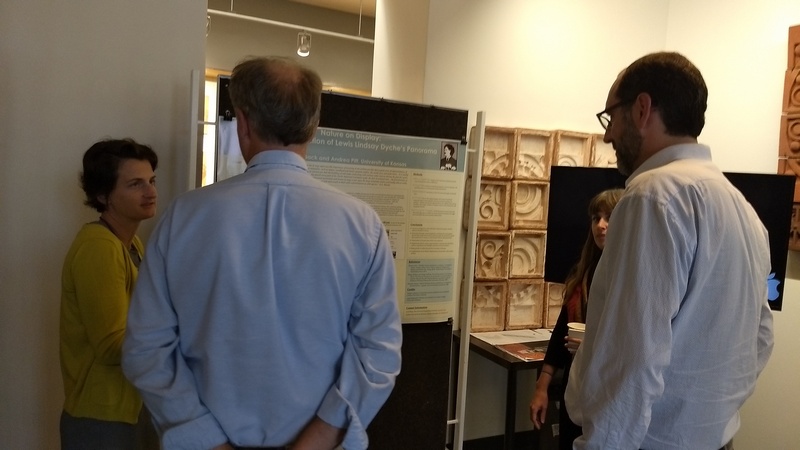
Several KU Graduate students, also recognized with the student showcase award, explored using digital tools for scholarship. Clarisse Barbier, with professor of French Van Kelly, showed her work with Voyant Tools for lexical and syntactic analysis of French author J. M. G. Le Clézio’s novel Onitsha. Danyelle Greene, Adrienne Frank, and An Sasala together presented a panel on their work with, respectively, Project Arclight and Lantern to study mammy characters in film; problems of allyship in Indigenous film exhibition; and comic book aesthetics. Titled Who/Where/When/Why/How Tells the Story, their panel raised questions about how the infrastructure of the digital scholarship—tools, collections, distribution mechanisms—shapes the very stories that can be told, heard, and studied. A panel session featuring instructors from the University of Missouri’s Digital Storytelling Program further demonstrated the range of approaches to digital storytelling, and a small poster session featuring examples of local and regional digital projects, along with movies by students in Mizzou’s program, rounded out the program.
The day ended with a wrap-up discussion led by IDRH’s Dhanashree Thorat, featuring KU Film & Media Studies professor Germaine Halegoua, along with keynote speakers Erb and Salter. We had an energetic audience throughout the day engaging meaningfully with the speakers, and discussing digital storytelling as it relates to humanities research, teaching, and learning. The multidisciplinary discussions sparked by the speakers ranged from genres of digital storytelling to the affordances and impacts of digital storytelling as public humanities. The broad scope of the research topics and the diverse methodologies which framed the conference illustrate the capacity of the digital humanities to foster rich interdisciplinary conversations.
We have shared the conference presentations on our YouTube Video Archive. We would like to extend our gratitude to all the speakers and participants, to our workshop instructors, to our colleagues Joshua Miner, Maryemma Graham, and Germaine Halegoua, who provided warm introductions to our keynote speakers, and to the entire program committee who spent months organizing and planning the event and ensuring that everything ran smoothly.
We hope you will join us in Lawrence, KS in October 2018, when we serve as host for Digital Frontiers 2018 and will explore the theme of Finding Community in Digital Humanities.
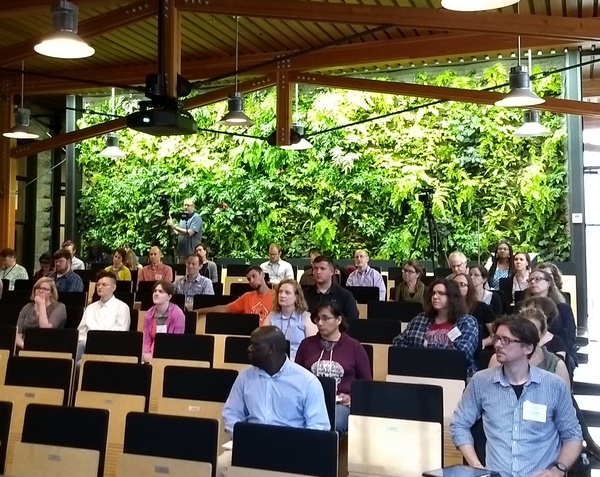
[1] Matthew Kleinmann was one of the winners of the 2017 DH Forum Student Showcase alongside Clarisse Barbier, Danyelle Greene, Adrienne Frank, and An Sasala. This award, which offers a small monetary stipend to winners, recognizes exceptional student presentations at the conference. ↵